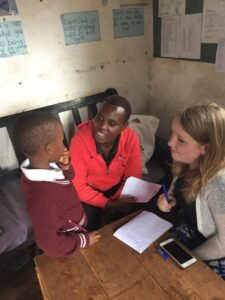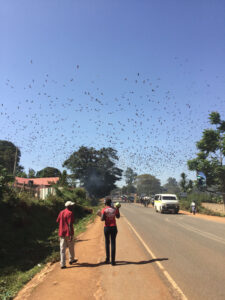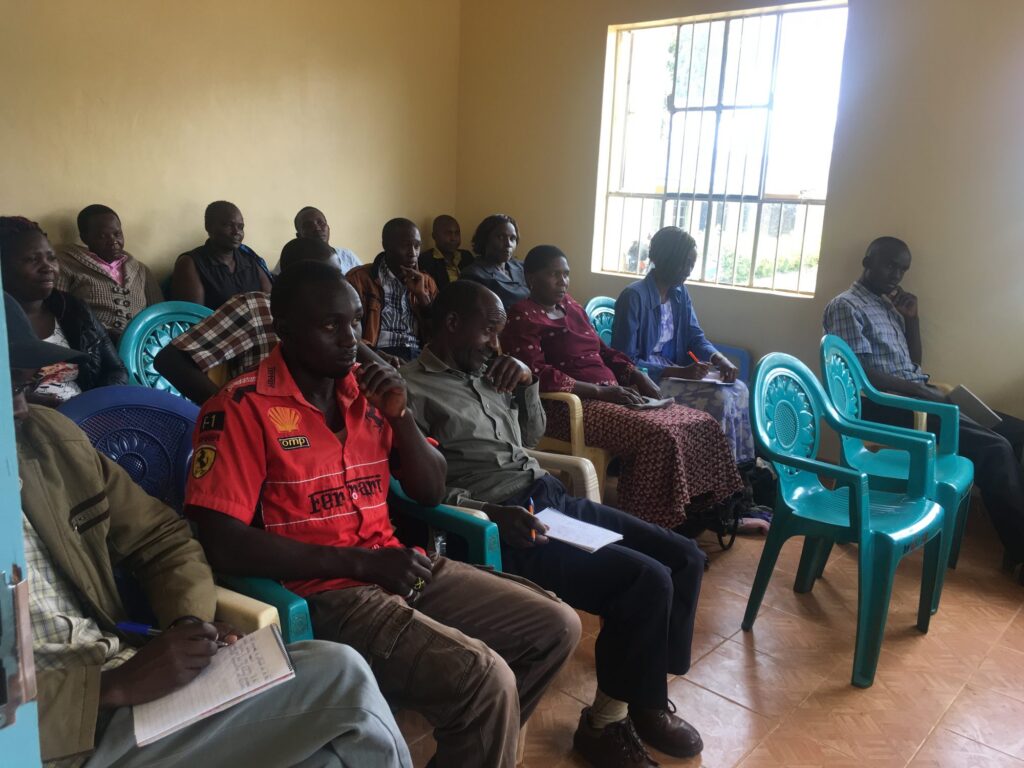By Phyllis Livaha
In early 2017, the researchers and I were busy collecting data for the challenge in Kisii. I felt the same excitement and sense of curiosity that motivated the previous Female Rights Challenge, and I wasn’t disappointed. It was mesmerizing to learn something new every day – and directly from the people we were engaging rather than from a classroom.
Getting the Important Information from the Community
 We found the interview partners very forthcoming, in no small part because local researchers introduced us to key local players. They accompanied us from one end of town to the other on some occasions, and they helped us navigate the hilly terrain. We enjoyed the boda boda (motorbike) rides, and we felt comfortable with the interview partners from the start. They readily discussed efforts to improve their economic status, the benefits they received, and the barriers they faced. Out of 40 people that we interviewed, only two people were suspicious and would not provide us with any information. I found the whole process invigorating, and somehow seemed to get more energy as the long days progressed. I always looked forward to meeting more people.
We found the interview partners very forthcoming, in no small part because local researchers introduced us to key local players. They accompanied us from one end of town to the other on some occasions, and they helped us navigate the hilly terrain. We enjoyed the boda boda (motorbike) rides, and we felt comfortable with the interview partners from the start. They readily discussed efforts to improve their economic status, the benefits they received, and the barriers they faced. Out of 40 people that we interviewed, only two people were suspicious and would not provide us with any information. I found the whole process invigorating, and somehow seemed to get more energy as the long days progressed. I always looked forward to meeting more people.
What Came Out of the Women Empowerment Challenge?
I discussed the focus group meetings we had with the community members in a previous blog, but what amazed me was how the community members yearned for knowledge. Most of the stakeholders we spoke with had received some kind of education, but most of them hadn’t completed secondary school for one reason or another. They spoke passionately about ADRA, an organization that had offered a short stint of adult education and information on female circumcision. Most of them were eager to figure out a way to eliminate corruption, and they attended the first training that had been organized during one of the last focus group meetings.
Mission Accomplished?
 A year later, I still find myself thinking about the wonderful people I met and the interesting twist on the results. While education was certainly a barrier to enhancement, the women and men of Kisii all agreed that corruption was the main barrier. Corruption – a word loaded with layers of endemic meaning – cannot be looked at in isolation. The community was willing to take action to combat it, and I have a strong sense that this is just the beginning. From my continued communication with some of the stakeholders, I learned that the recent election complications in the country slowed people down, but that did not extinguish the fire of enthusiasm to enhance themselves through civil education.
A year later, I still find myself thinking about the wonderful people I met and the interesting twist on the results. While education was certainly a barrier to enhancement, the women and men of Kisii all agreed that corruption was the main barrier. Corruption – a word loaded with layers of endemic meaning – cannot be looked at in isolation. The community was willing to take action to combat it, and I have a strong sense that this is just the beginning. From my continued communication with some of the stakeholders, I learned that the recent election complications in the country slowed people down, but that did not extinguish the fire of enthusiasm to enhance themselves through civil education.
Lessons Learned
Participatory Action Research has taught me that great minds are everywhere. I have learned from this challenge that actions can be taken to reduce corruption, but only if those actions are integrated into reforms at both the community and state levels. The reason is that a certain role of the community and the state almost inevitably create a fertile ground for corruption. I have also learned that when entire communities, meaning the women and the men, work together, great things happen. I love these lessons. I want to keep learning.

